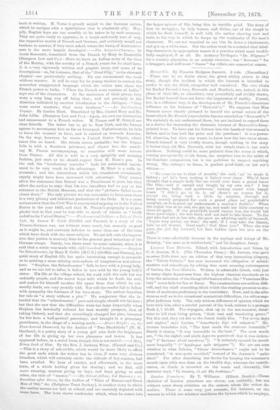Haworth's. By Frances Hodgson Burnett. 2 vols. (Macmillan.) —There can
be no doubt about the great ability shown in this story, though the incident in which the interest is intended to centre is not, we think, altogether well conceived. The two rivals for Rachel French's love, Haworth and Murdoch, are, indeed, in this phase of their life, as elsewhere, very powerfully and vividly drawn, but Rachel herself does not leave the impression of reality. Unreal, too, in a different way, is the development of Mr. French's disastrous influence on the fortunes of " Haworth's." We suppose that Miss Burnett never clearly pictured to herself the actual nature of the losses which Mr. French' a speculative fancies entailed on " Haworth's." We certainly do not understand them, but are inclined to regard them as a device for increasing the dramatic interest of Haworth's disap- pointed love. To have put his fortune into the hands of this woman's father, and to lose both the price and the purchase! it is a power- ful situation, but then one wants to know how the loss came about. French himself is very vividly drawn, though nothing in the story is better than old Mrs. Haworth, with her simple trust in her son's goodness. Nothing could be more pathetic than the scene in which, coming unexpectedly to his house, she surprises him in the midst of his dissolute companions, but is too guileless to suspect anything wrong. She enlarges to thorn, in perfect good-faith, on her son's virtues :—
" Ho come to me in time of trouble,' she said, an' he made it lighter ; an' he's been making it lighter ever since. Who'd have thought that a simple body like me would ever have a grand home hike this,—and it earned and bought by my own son P I beg your pardon, ladies and gentlemen,' looking round with happy
tears. didn't go to do it, au' there's no reason for it, except me being took a little by surprise, througlt not being exactly prepared for such a grand place an' gentlefolk's comp'ny, as is so good, an' understands a mother's feelin's.' Whoa the repast was at an end, she got up, and made her little courtesy to. them all again. If the gentlefolk would excuse her, she would bid them good-night ; she was tired, and not used to late hours. To the girl who had sat at her side, she gave an admiring smile of farewell. 'You're very pretty, my dear,' she said, 'if I may take the liberty, beite an old woman. Good-night ! God bless you!' When she was gone, the girl lay forward, her face hidden upon her arm on the table."
There is some admirable humour in the sayings and doings of Mr. Briarloy, "the man as is misforchnit," and his daughter, Amoy.


































 Previous page
Previous page